

What is a VPN and how does it work? Your guide to internet privacy and security. Whether you're in corporate office or home office, on the road or in your home, a VPN is one of the best ways to protect yourself on the internet.
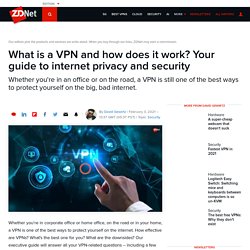
How effective are VPNs? What's the best one for you? What are the downsides? Our executive guide will answer all your VPN-related questions -- including a few you probably haven't thought to ask. How to check if someone else accessed your Google account. Review your recent Gmail access, browser sign-in history, and Google account activity to make sure no one other than you has used your account.
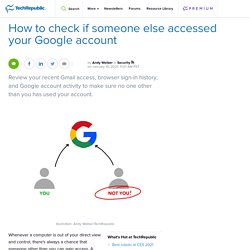
Whenever a computer is out of your direct view and control, there's always a chance that someone other than you can gain access. Why this fraud expert says you should never, ever use a debit card. Every year, millions of American consumers — nearly 7% of the population — are victims of scams and fraud.

In 2017, the number of fraud victims in the US reached 16.7 million, with $16.8 billion lost. For more than 45 years, I’ve worked with, advised and consulted with the FBI and hundreds of financial institutions, corporations and government agencies around the world to help them in their fight against fraud. But my expertise began more than 50 years ago, in an unusual way: I was one of the world’s most famous con artists. You should stop using WhatsApp right now. Thank goodness I stopped using WhatsApp when I did – things are about to get MESSY.
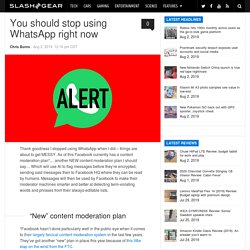
As of this Facebook currently has a content moderation plan*… another NEW content moderation plan I should say… Which will use AI to flag messages before they’re encrypted, sending said messages then to Facebook HQ where they can be read by humans. Messages will then be used by Facebook to make their moderator machines smarter and better at detecting term-violating words and phrases from their always-editable lists. “New” content moderation plan *Facebook hasn’t done particularly well in the public eye when it comes to their largely farcical content moderation system in the last few years. They’ve got another “new” plan in place this year because of this little slap on the wrist from the FTC.
It's Time to Switch to a Privacy Browser. Posting About Your Kids Online Could Damage Their Futures. You child's digital footprint can begin before birth.Getty Now that 6.8 million more people have just had their (private!)
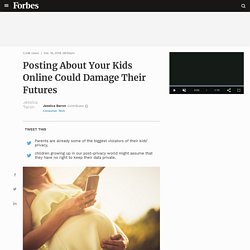
Facebook photos exposed, it seems like a good time to talk about online privacy, especially when it comes to what people post about their children. Parents are already some of the biggest violators of their kids’ privacy, leaving potentially harmful digital footprints well before the age of consent. A child or teenager’s digital footprint now starts before birth. From ultrasound photos and due date announcements posted to social media to the proliferation of smart toys, parents are revealing far more information than they realize about their children. This technology coupled with parents’ behavior is increasingly putting children at risk for identity theft, humiliation, various privacy violations, future discrimination, and causing concern about developmental issues related to autonomy and consent.
The rise and risks of “sharenting” The U.K. report warns: How Personalization Leads to Homogeneity. The phrase "people are products” has become a cliché.

That tells you something is wrong. It implies normalization of some rather heinous ideas. To buy and sell people rings of slavery. It reduces people to things, objects, resources, or mere means. As one of us (Deven Desai) wrote: “Treating a person like a resource is [a fundamental] error.” We need to examine the role of personalization in programming people as products. A few familiar examples show how personalization can be lead to homogenous behavior. This personalized-input-to-homogenous-output (“PIHO”) dynamic is quite common in the digital networked environment. For example, Facebook offers highly personalized services on a platform optimized to produce and reinforce a set of simple responses—scrolling the feed, clicking an ad, posting content, liking or sharing a post.
A very similar story can be told for many other platforms, services and apps. It can even go deeper than that. The ultimate guide to finding and killing spyware and stalkerware on your smartphone. X Learn More Stolen Israeli surveillance software was listed on Dark WebThe staff member stole Pegasus spyware code and attempted to sell it in the Dark Web.
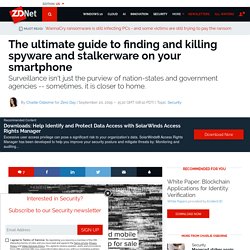
Our digital selves, more and more, are becoming part of our full identity. The emails we send, the conversations we have over social media -- both private and public -- as well as photos we share, the videos we watch, and the websites we visit all contribute to our digital personas. There are ways to prevent a government agency, country, or cybercriminals from peeking into our digital lives.
Lifehacker. How to turn off Google's location tracking. When you turn off “location history” Google still tracks your location when you use several of its key services including Maps, search and the weather.
Here’s how to really turn all of it off. A report from the Associated Press has highlighted that the feature called location history is just one of the systems that Google uses to track your location for personalised services, local search and other purposes such as advertising. When you turn off location history, Google stops automatically recording your location for features such as the Maps timeline, but it warns you that “some location data may be saved as part of your activity on other Google services, like Search and Maps”. When you perform a search, access Google Maps, or get the weather, either manually or automatically through a smartphone widget, Google will still log your location. - The Washington Post.
How to purge all your search histories. Every time you run a search online, the websites where you maintain an account can record that information.

This data—collected and stored by search engines like Google, social media networks like Facebook, and retail giants like Amazon—won't disappear when you erase your browser's search history. Ostensibly, these sites use your search history to assemble a profile of you, allowing them to show you content or products that will appeal to your interests. Conveniently for these tech companies, better understanding your preferences also lets them serve you targeted advertisements.